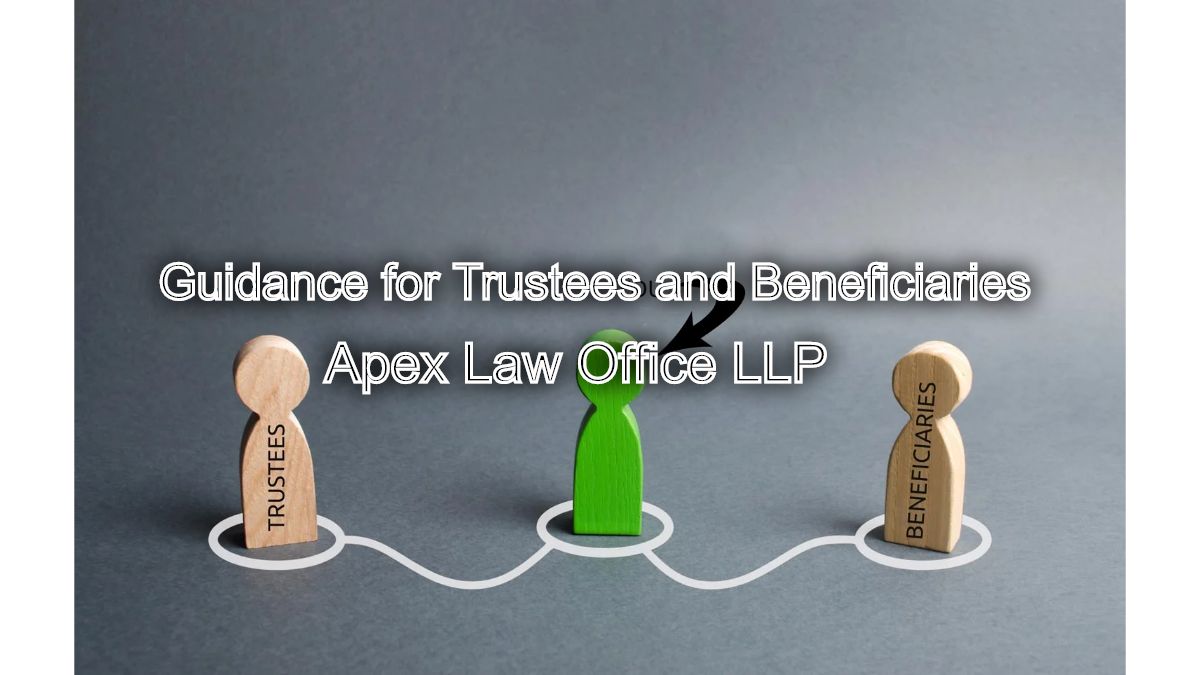Trust Laws: A trust is a legal arrangement where a person, known as the settlor, transfers assets to a trustee to hold and manage for the benefit of another person, known as the beneficiary. Trust laws govern the creation, administration, and termination of trusts. These laws vary from jurisdiction to jurisdiction, but they generally aim to protect the interests of beneficiaries and ensure that the settlor’s wishes are carried out.
Trust Laws: Legal Guidance for Trustees and Beneficiaries: Apex Law Office LLP
Understanding the Basics of Trust Law
At the heart of trust law lies the concept of fiduciary duty. A trustee is obligated to act in the best interests of the beneficiaries. This duty is both legal and ethical, requiring the trustee to exercise prudence, loyalty, and impartiality in managing the trust assets.
Key Components of a Trust
- Settlor: The person who creates the trust.
- Trustee: The individual or institution responsible for managing the trust assets.
- Beneficiary: The person who benefits from the trust.
- Trust Property: The assets transferred to the trust.
Types of Trusts
- Revocable Trust: A trust that can be modified or terminated by the settlor.
- Irrevocable Trust: A trust that cannot be modified or terminated by the settlor.
- Testamentary Trust: A trust created through a will and takes effect upon the settlor’s death.
- Living Trust: A trust created during the settlor’s lifetime.
The Role of a Trustee
A trustee’s responsibilities are multifaceted and include:
- Investment Management: Making prudent investment decisions to grow the trust assets.
- Distribution of Income and Principal: Disbursing funds to beneficiaries according to the terms of the trust.
- Recordkeeping: Maintaining accurate records of all trust transactions.
- Tax Compliance: Ensuring that the trust complies with all applicable tax laws.
- Accountability: Providing regular accountings to the beneficiaries.
Rights and Responsibilities of Beneficiaries
Beneficiaries have certain rights, including:
- Right to Information: The right to receive information about the trust’s assets and income.
- Right to Distribution: The right to receive distributions of income and principal according to the terms of the trust.
- Right to Challenge the Trustee: The right to challenge the trustee’s actions if they believe the trustee is not acting in their best interests.
The Importance of Legal Counsel
Navigating the complexities of trust law can be challenging. Consulting with an experienced trust attorney can help ensure that your trust is properly structured and administered. An attorney can assist with:
- Drafting Trust Documents: Creating clear and comprehensive trust documents that reflect your intentions.
- Choosing a Suitable Trustee: Selecting a qualified and trustworthy individual or institution to serve as trustee.
- Managing Trust Administration: Providing guidance on investment strategies, tax planning, and other administrative matters.
- Resolving Disputes: Mediating disputes between beneficiaries or between beneficiaries and the trustee.
- Protecting Beneficiaries’ Interests: Protecting the beneficiaries’ rights.
FAQs: Trust Laws and Legal Guidance
A trust is a legal arrangement where you, as the settlor, transfer assets to a trustee to hold and manage for the benefit of beneficiaries. People can use trusts for various purposes, such as asset protection, estate planning, and charitable giving.
A trustee has a fiduciary duty to act in the best interests of the beneficiaries. This includes managing trust assets, making investment decisions, distributing income and principal, and ensuring tax compliance.
Whether you can modify or terminate a trust depends on its type. The settlor can change or revoke revocable trusts, while irrevocable trusts cannot be changed.
A trust attorney can help you create a customized trust that aligns with your goals, select a suitable trustee, ensure compliance with tax laws, and protect the interests of your beneficiaries.
To ensure smooth administration, it’s crucial to choose a reliable trustee, provide clear instructions in the trust document, and work closely with your attorney to address any issues that may arise.
Conclusion
Trusts are powerful legal tools that can provide significant benefits for both settlors and beneficiaries. By understanding the fundamental principles of trust law and seeking legal advice, you can create and manage trusts effectively. Apex Law Office LLP, a leading law firm in Chennai, offers comprehensive legal services to individuals and families seeking guidance on trust law matters. With a team of experienced attorneys, we can help you protect your assets and ensure a smooth transition of wealth to future generations.
Read More
- Legal Labyrinths with Wisdom and Experience: Expert Attorneys By Your Side
- Ensuring Legal Protection for Vulnerable Family Members Under the National Trust Act
- Victims of road accidents: Roadmap in online for fast and easy compensation
- Voluntary Surrender of Registration: Relief To Tata Trust by ITAT
- Whether the benefit of bonafide mistake will be available for determining penalty u/s 270A?
- National Portal of India:

